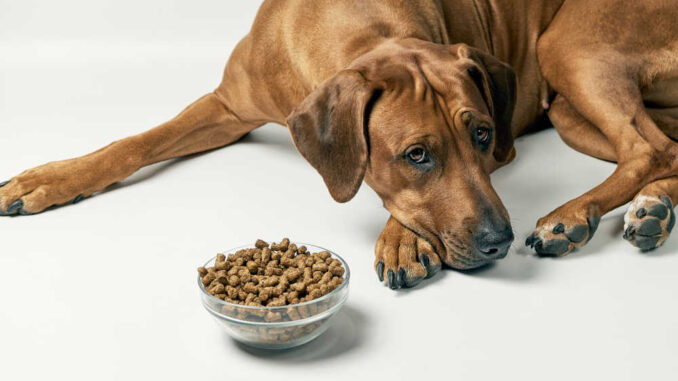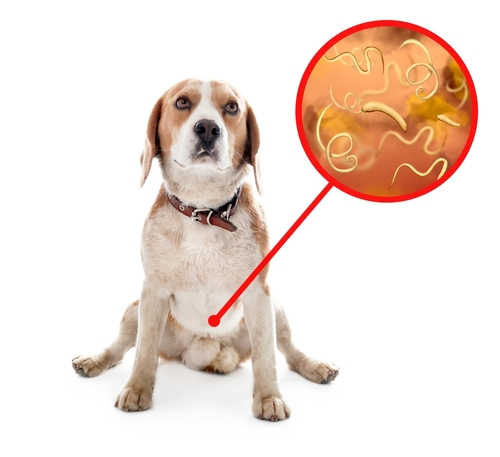
This article was updated on March 14th, 2024
In practice, I routinely heard questions like, “Doc, why is my dog lethargic and not eating?” When I heard the question, I would explain the possible reasons for the concerning symptoms and how I could help Fido. In this article, I will discuss the main reasons dogs suddenly act lethargic and have no appetite, how to diagnose each condition, and what can be done at home and at the vet to help your pooch.
What are the top causes of dogs acting lethargic and not eating?
Various reasons may explain why your dog won’t eat or drink and is lethargic. The main causes include:
1. Parasitic infection

When dogs become infested with intestinal parasites, the presence of worms in the gastrointestinal tract can cause nausea and a loss of appetite. The most common internal parasites that plague canines include roundworms, hookworms, tapeworms, and whipworms. Parasitic infections are fairly common in dogs, but they’re usually easy to treat and prevent.
Signs of parasitic infection include:
- Loss of appetite
- Decreased activity/lethargy
- Diarrhea
- Vomiting
- Weight loss
- Bloated abdomen
- Parasites in poop or vomit
- Scooting
- Coughing/labored breathing
There aren’t any reliable home remedies for treating intestinal parasites in dogs. If you suspect your dog has a parasite infection, the best way to manage it is to bring your pooch to the veterinarian. They will examine your pup and run a fecal test to confirm the presence and type of parasites.
Once the doctor reaches a diagnosis, they will prescribe the best anthelmintic medication to treat your dog. The prognosis for dogs suffering from parasitic infections is generally favorable with treatment.
2. Bacterial or viral infection
Dogs can get gastrointestinal infections just like humans. When bacteria or viruses cause inflammation in the gut, dogs will frequently act lethargic and stop eating. Upset stomachs from infections are relatively common in dogs.
Signs of a gastrointestinal infection include:
- Loss of appetite
- Lethargy
- Vomiting
- Diarrhea
- Low-grade fever
If your dog suddenly shows signs of a digestive infection, rest their gut by withholding food for 1-2 meals. Provide ample water and encourage him to drink to prevent dehydration. Depending on the type of infection, symptoms may resolve in a day or so. If your dog’s symptoms continue longer than a day, contact your veterinarian.
When you take your pooch to the veterinarian, the doctor will examine your pooch and get a thorough history. Diagnostic tests may include bloodwork, a fecal analysis, urinalysis, and x-rays. Depending on the diagnosis and severity of symptoms, treatment may include:
- Antibiotics
- Antidiarrheal or anti-emetic drugs
- IV fluids
The prognosis for dogs that suffer from bacterial or viral infections is generally favorable but varies depending on the type and severity of the infection.
3. Gastrointestinal obstruction
If your dog experiences an obstruction, they will act lethargic and stop eating. Unfortunately, blockages are all too common because dogs use their mouths to explore and tend to swallow non-digestible materials. Symptoms of an obstruction include:
- Lethargy
- Loss of appetite
- Vomiting
- Diarrhea
- Abdominal pain
- Bloating
- Hunched appearance
- Dehydration
Gastrointestinal obstructions are emergency situations that require prompt veterinary care. Dogs can quickly dehydrate or go into shock without treatment.
When you take your dog to the clinic, the vet will examine your pooch and take diagnostic tests, which may include bloodwork and x-rays. Depending on the nature and location of the obstruction, the doctor may use endoscopy or surgery to remove the blockage, or surgery may be required. The prognosis for dogs with gastrointestinal obstruction depends on how quickly your dog receives treatment.
4. Anxiety or depression
Dogs share many of the emotions that humans experience. If your dog won’t eat or drink and is lethargic but shows no other symptoms, they may feel a little blue.
Review recent changes in your routing or your pup’s circumstances. If they recently lost an owner or another housemate, they may be mourning and feeling lonely. Sudden schedule changes may trigger anxiety, particularly if you’ve been away from home more frequently. If you identify potential causes of anxiety or depression, you may be able to help your furbaby. Sometimes, it’s as simple as paying extra attention to your special pal. Take them for longer walks or add a few cuddle/play sessions.
Other reasons dogs can lose their energy and appetite
While not as common as some of the causes listed above, reasons dogs can also suddenly be lethargic and have no appetite include:
5. Kidney or liver disease
Dogs with systemic conditions such as kidney disease or liver failure often exhibit lethargy and anorexia. Kidney and liver disease are common conditions in older dogs. If your furbaby has a metabolic disease, you may notice:
- Anorexia
- Vomiting and diarrhea
- Weakness and lethargy
- Dehydration
- Blood in poop or blood in pee
- Seizures
- Confusion
- Unsteady gait/stumbling
- Increased thirst/urination
- Yellow membranes/jaundice(liver disease)
6. Heart disease
Dogs can develop heart disease and congestive heart failure. It may be caused by old age, an infection, or heartworm disease. Signs of heart failure or disease include:
- Exercise intolerance/lethargy
- Coughing, particularly at night
- Fainting
- Weight loss
- Loss of appetite
- Fluid buildup in the abdomen
7. Pain
Dogs in pain often act lethargic and lose interest in eating. If your pup has an injury, dental disease, or arthritis that’s causing them significant pain, you may notice:
- lethargy/reluctance to move
- Refusal to eat
- Excessive drooling(dental disease)
- Limping(injury or arthritis)
- Whining or crying
- Panting
8. Medications or toxins
Dogs can react to certain medications with a loss of appetite and lethargy. Check with your veterinarian about potential side effects. If your furbaby ingests a toxin, you may also notice sudden lethargy and anorexia. However, in the case of toxins, dogs will usually pant or have rapid respirations as well. If you suspect poisoning, immediately contact your veterinarian or the Pet Poison Helpline.
9. Poor diet
Dogs can also become lethargic and stop eating because their diet is insufficient. If you’re feeding a cheap brand that contains lots of fillers and lacks quality ingredients, your furbaby may not have enough energy to be active. Additionally, the food may not be appealing to them.
How can I figure out what’s causing my dog to act lethargic and stop eating or drinking?
If your dog is suddenly lethargic and has no appetite, watch for other signs or symptoms. Ask yourself if there have been any recent changes in routine or diet that may be trigger events. Has your dog recently been around other dogs that could have passed an infection?
If you don’t see any other changes in behavior, observe your dog for a day. They may simply be under the weather. If they don’t bounce back, contact your veterinarian.
You can work with your veterinarian to figure out why your dog isn’t eating and is acting lethargic. The doctor can conduct a thorough physical exam and run diagnostic tests, including:
- Blood tests
- Fecal exam
- Urinalysis
- X-rays
What can I do at home to help a lethargic dog if they are not eating or drinking?
If your dog isn’t eating or drinking and is acting lethargic but doesn’t have other serious symptoms of illness, you may be able to stimulate their appetite at home.
- Try warming the food
- Pour some low-sodium beef or chicken broth over the kibble
- Try hand-feeding your pooch
- Switch from dry kibble to wet food or vice versa
- Try a meal topper
- Ensure your dog has free access to water
Learn more with our 9 tips to help your dog eat more.
Is it an emergency if my dog is lethargic and not eating?
If your dog stops eating and acts lethargic but has no other concerning symptoms, they may simply have a mild virus. As long as they are still drinking water, you can let your pup rest and try to encourage them to eat for a day or so.
When the symptoms last longer than 1-2 days, or if you notice other signs, you should contact your veterinarian. Watch out for symptoms such as:
- Not drinking water
- Repeated vomiting or diarrhea
- Bloating
- Abdominal pain
- Hunched appearance
- Blood in the vomit or stool
If you notice any of the above, get your pooch to the clinic as soon as possible.
Disclaimer: This website's content is not a substitute for veterinary care. Always consult with your veterinarian for healthcare decisions. Read More.


Be the first to comment